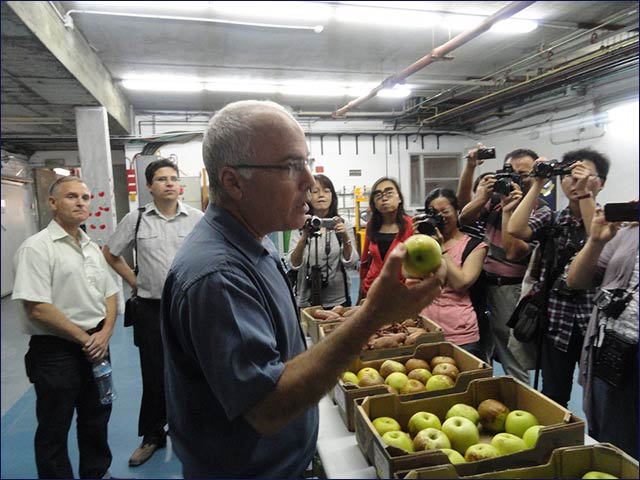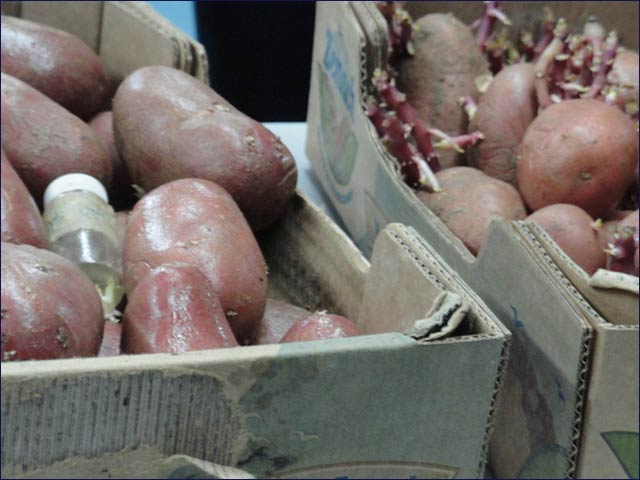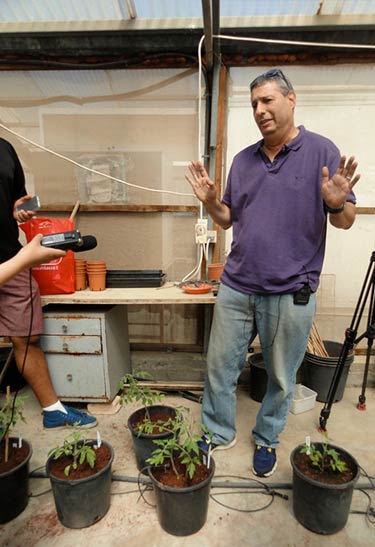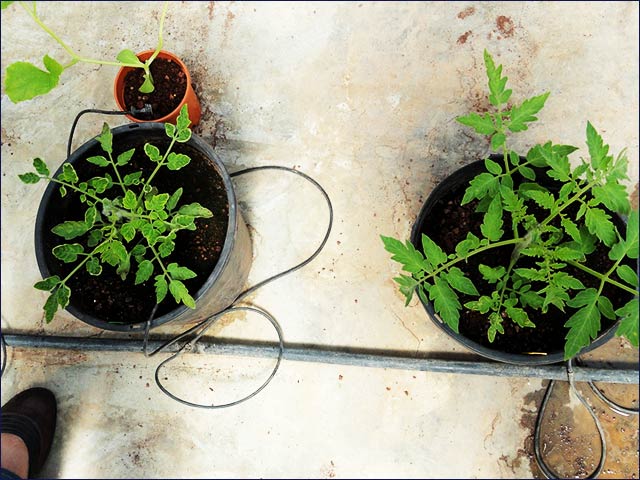By Rivka Borochov
Look to an Israeli advance in agriculture and there is a good chance that the research was pioneered at Israel’s Agricultural Research Organization (ARO).
“We are the largest agricultural institute in Israel, providing 70 percent of Israel’s agricultural research –– all under one roof,” says Ada Rafaeli, the associate director for international cooperation and academic affairs at the ARO.
The heart of the ARO is the Volcani Center in Beit Dagan, in the center of the country. Two other centers, Neve Yaar in the Galilee and Gilat in the Negev desert, have field schools and pilot sites that test agricultural best practices for all of Israel’s climate ranges and conditions.
“The climate here is conducive to making Israel a field institute for the rest of the world,” says Rafaeli, citing the more famous examples of ARO research and applications that are sought out the world over, from foreign government delegations to multimillion-dollar seed companies to the humble African or Asian farmer.
Some of these interest groups get a chance to come to Israel and visit the Volcani Center in person.
If it’s the right season, says Rafaeli, they can also taste all of the center’s unique citrus varieties, the most famous one being the “Or” tangerine exported to Europe and in demand for its easy-to-peel skin and pip-less fruit.
Volcani is responsible for other kinds of treats, too, such as the cherry tomato that actually tastes like a cherry because it’s grown with saline water and builds up a high sugar content.
The center is available to businesses, academics and farmers from near and far to help them find the farming and agriculture solutions they are seeking.
What might be sought out? How about the right colored net to improve crop yield, or a genetically engineered seed to repel insect pests? Consider pioneering genetic research to grow a better chickpea for hummus, containing more protein per bean.
The ARO has been actively establishing new forests on desert land to curb greenhouse gas emissions and show how modern agricultural practices can help an advancing desert retreat.
Precision agriculture is another Israeli advance. This ARO specialty delivers custom-made solutions to help every farmer get the right amount of water, fertilizer and pesticide to where it’s needed – no more, no less.
Ecological dairy farms
Israel has become a world leader in producing more milk per cow, a result that has come from breeding techniques, milk monitoring and improved feed and nutrition says Joshuah Miron, head of the Department of Ruminant Science at the Volcani dairy farm.
He explains that with the price of imported grain at $350 a ton, Israel wouldn’t be able to afford drinking milk from grain-fed cows. For that reason, the Volcani Center has developed a new vegetarian feed based on olive harvest waste and byproducts from food industries around Israel. The Volcani-assisted Afimilk system provides an extra layer of security to make sure the cows eating this feed make healthy milk.
Cow manure is sent back to the field, as the cows ruminate in the cow shed while being showered with recycled water to keep them cool and happy.
How Israel feeds a hungry world
The Volcani Center’s underground Gene Bank has a massive repository of Levantine-based seeds.
The seeds have been stored there, some since 1979, to protect the genetic diversity of plants that may become lost to the region. They also serve as the research basis for solutions to current and future problems for feeding a hungry world.
“We focus on research that relates to the global crisis,” says Rafaeli.
In the past, she says, one farmer was able to feed about 15 people. Now, with the growth of the world’s population, mainly in developing regions, that same farmer is expected to feed 100 people.
This puts stress not only on the farmer, but also on land and limited water reserves. The ARO has pioneered sophisticated breeding techniques to make fruits and field crops heat-tolerant, naturally pest resistant or able to grow on limited water supplies.
This translates to more crop per drop, produced in a sustainable manner that is friendlier to the earth than traditional methods.
Also to meet the needs of the global food crisis, the ARO applies genetic research in creating new wheat varieties, some incorporating genes from ancient wheat varieties to make heartier crops, and others for feeding livestock.
Natural solutions for long-term produce storage
Ever since humankind discovered the ability to grow food, the problem of how to store it long into the future has been a big challenge. But Israel might have food storage in the (grocery) bag.
Consider the Bible’s Joseph, an Israelite who managed to win the Pharaoh’s favor –– and an out-of-jail pass –– by helping Egypt store grain and avert famine over a seven-year period.
Today, the Volcani Center is helping to meet the worldwide appetite for year-round fresh produce by offering some novel natural alternatives to chemical means for prolonging shelf life.
Storing apples and potatoes
Amnon Lichter, a researcher in post-production at the Volcani Center in Beit Dagan, shows visiting reporters some of the center’s research-tested solutions using mint oil and oxygen starvation among other tactics.

Lichter showing off Volcani apples Apples and potatoes are two kinds of fresh produce that have the potential to last months, sometimes up to a year, in cold storage. As the new apples are coming in season, it is not rare to find last year’s harvest still for sale.
Nevertheless, there are problems in apple and potato storage yet to be tackled.
One solution developed by the Volcani Center is to stop apples from turning brown in the fridge. The brown is caused by phenols, a compound that apples produce.
By exposing the apples to nitrogen for a week, effectively cutting off the oxygen source, the researchers are able to change the biological activity of the apples, reduce the phenols produced, and keep the apples’ natural color longer without using chemicals.
This solution is being applied commercially to pears to begin with, says Lichter.
He then points to treated and untreated boxes of potatoes grown and stored at the center. One lot was treated with a mint spray. The non-treated potatoes are growing sprouts and turning green, while those treated with concentrated mint extract, applied about once a month, look fresh. This solution is in use on the Israeli market.

Can you guess which batch of potatoes
was treated with mint oil? Better, safer grapes
While fungicides are effective in stopping the decay of fruits and vegetables and preventing the dangerous aspergillus mold from contaminating food, they can harm the kidneys of the young, elderly or immune-compromised if consumed in unregulated amounts. “People who are taking cancer drugs are particularly sensitive,” says Lichter, who specializes in grapes.
The grape industry is particularly fussy about fungicide residue thanks to the European wine industry, he relates, but other fruits and vegetables aren’t so closely monitored unless it’s a brand name, he says.
He does not think organically grown produce is necessarily the way to go because of the fear of aspergillus fungi, which can be toxic. The mold is particularly prevalent in warm, moist environments such as in the Mediterranean area.
Farmers can spend about 50 percent of their budget on post-harvest treatments, says Lichter. If they don’t use fungicides at all, they stand to lose up to 30 percent of their crop.
Because he doesn’t envision that fungicides will ever be completely eliminated in conventional agriculture, Lichter tries to find a happy balance in which the stored fruit lasts the longest possible time with the lowest possible levels of fungicide.
“In order to minimize the use of fungicide, we want to find the window of time before harvest when the crops can be sprayed to have the desired effect with the least amount of residue on the crop,” he explains.
Volcani Center’s virus-fighters for tomatoes
Global food producers are looking earnestly for a new, non-chemical way to fight whitefly infestation on tomato plants.
“One of our biggest potentials is China, a new market for tomatoes. It’s a rising market and, surprisingly, China is now one of the world’s largest producers of fresh market tomatoes,” says Moshe Lapidot from the Department of Vegetable Research in the Institute of Plant Sciences at the Volcani Center-Agricultural Research Organization (ARO) in Israel.
Using transgenic research and traditional breeding programs, Lapidot works in the field of viral resistance. He is the go-to guy for solutions to keep viruses from infecting tomatoes, peppers, watermelons, melons and cucumbers.

Moshe Lapidot demonstrating his experiments
in his greenhouse lab at the Volcani Center Whiteflies (Bemisia tabaci) take up a majority of his research time due to the global significance this pest has on food production.
It is not the flies themselves that are of import, but the viruses that tag along with them. Like mosquitoes that can transmit malaria to humans, whitefly-transmitted viruses infect plants.
“There is no medicine for [plant] viruses,” says Lapidot, who specializes in a group of viruses called begomoviruses and is considered one of the top experts in the world. “We create virus-resistant plants,” he says.
Devastating world food resources
Originating in the Mediterranean region, whiteflies are spreading themselves and their diseases around the plant world –– they are now found in California, Mexico, Guatemala and China, for instance. Crops infested by whitefly-transmitted viruses will produce little yield, says Lapidot.
Facing a large delegation of foreign reporters, many from East Asia, and all eager to hear about more efficient ways of feeding a hungry planet, Lapidot shows the stark difference between a regular tomato cultivar and one with begomovirus resistance.
 The tomato plant on the left is untreated; the one on
The tomato plant on the left is untreated; the one on
the right treated to fight whitefly-related virus
The plant without resistance suffers from the tomato yellow leaf curl that is responsible for much economic damage to vital food and cash crops such as tomatoes and beans. Other begomoviruses cause heavy losses on squash, cotton and cassava farms.
“It can be devastating to tomato crops in tropical and subtropical regions,” Lapidot stresses.
The virus and its associated fly began becoming a severe problem in the 1970s. The whitefly has been found to transmit more than 60 plant diseases. Losses to whitefly amount globally to hundreds of millions of dollars.
Lapidot’s lab at the Volcani Center in Beit Dagan, Israel, has developed a novel way of breeding viral resistance into tomato plants –– a technology that can be used in the seeds of any tomato variety. This technology takes away the need to spray crops for whiteflies.
Keeping pink tomatoes healthy
Lapidot uses classic breeding techniques, not genetically modified organisms (GMOs), to introduce resistant genes into tomato varieties.
“The transgenic plants express the resistance gene,” he says.
One viral resistance gene he has isolated is called the TY5 gene. Seed companies in Spanish, Moroccan and Turkish markets are now selling TY5 widely.
“This is already being used commercially for a couple of years,” says Lapidot. “The market for us here is to put the gene into the tomato that the consumer wants.”
Chinese consumers, it turns out, want pink tomatoes. Introducing viral resistance to pink tomatoes is therefore something Lapidot is keen on doing.
The technology is available through seed companies, like Israel’s Hazera, to help global companies give farmers around the world a weapon for controlling whitefly-transmitted viruses.
Happy cows with high milk yields, healthy agricultural produce from seeds to long-term storage – the Volcani Institute meets all challenges and finds user-friendly solutions that are used the world over.